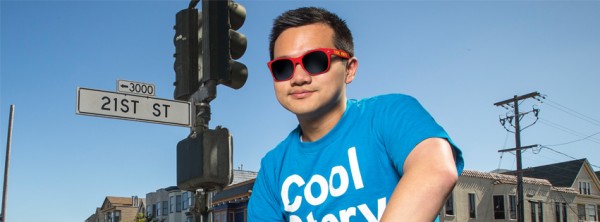By Victor Li
Tim Hwang went to law school and became a lawyer for one reason: To kill the legal profession as we know it.
Fascinated by the possibilities of using technology and automation to create efficiencies that were not present in the legal market, Hwang figured the best way for him to test his theories would be to become a lawyer.
“I saw myself as being undercover at law school,” says Hwang, who graduated from the University of California at Berkeley’s Boalt Hall in 2013. He then joined Davis Polk & Wardwell, but unlike many of his fellow first-year associates, he wasn’t looking to make partner. Indeed, he didn’t even make it to his yearly evaluation. All he wanted to do was test out some software he had developed to do much of his work for him.

Photo of Tim Hwang by Tony Avelar.
Once he knew his software worked, he set about his real objective. Hwang set up his own law firm that would use technology to automate as much paperwork as possible, freeing up lawyers to concentrate on more complex matters.
The name of the firm, Robot Robot & Hwang, was originally a joke (Hwang lists his two senior partners as Apollo Cluster, a supercomputer that graduated from Harvard Law School, and Daria, an XR-1029 computer that has a JD from Boalt Hall and an LLM from Stanford), and Hwang says he’ll probably change it at some point.
“Part of the problem with law firms is that, from a client’s point of view, they haven’t thought a great deal about what their users want,” Hwang says. The firm hasn’t officially launched as Hwang says he’s still testing out the technology and workflow, but it is already representing some clients on IP and incorporation matters.
“Like any other firm, we do a lot of our work by hand at first and struggle through it so that we can learn the flow of it,” Hwang says. “The idea is to identify things that could be automated.”
One such area is the paperwork related to starting up a company. Hwang points out that drafting articles of incorporation and dealing with intellectual property assignments, employee contracts and nondisclosure agreements are tasks that can be automated; and they make up the bulk of the work the firm is currently doing. Hwang is also releasing software designed to automate document review and filings of initial public offerings.
“We intend to build up our database based on the work we get from clients,” Hwang says. “That will allow us to be more efficient on future projects. We can also charge our clients a flat fee.”
He hasn’t forgotten about his law firm days, either. Hwang says he plans on introducing software that will allow junior associates to automate their workload the way he did at Davis Polk. The free, open-source software is called Top Gun, and, according to Hwang, is themed after the 1986 movie starring Tom Cruise (“I feel the need—the need for speed!”).
“We’re hoping to provoke a broader discussion about the price of legal services and the efficiency of legal practice in general with it,” he says.
Hwang has always been ahead of the curve. While a Harvard undergraduate, he worked at the college’s Berkman Center for Internet & Society and found himself surrounded by others who saw the potential of technology and the Internet.
“Tim is someone who sees things others don’t, especially when it comes to technological advances,” says Elizabeth Stark, an entrepreneur and former lecturer in tech policy who met Hwang at the Berkman Center. “He’s taken the lessons learned from the Internet and applied it to other spaces, like the law. Maybe it sounds crazy to a lot of people now, but in 20 years it might not be so crazy.”
Stark points out that in 2008 Hwang started ROFLCon, a convention for Internet memes, before they became widely popular. A recent Forbes article noted that Hwang relied on crowdfunding for his Awesome Foundation, which provides $1,000 grants each month to innovative projects, before Kickstarter came about.
The best part about automating his work? Hwang says he actually has more free time. He is now head of special initiatives at Imgur, an image-sharing and meme-generation website. He’s also working on fulfilling a Kickstarter campaign to create a pocket-size, waterproof guide to shipping containers (he and a partner raised $21,503, almost twice their goal, in April).
And he has one eye toward the future, saying law firms will eventually be mostly automated, freeing up humans to handle complex matters as well as establishing large R&D divisions.
“We’re always looking to see what new areas can be automated,” Hwang says.